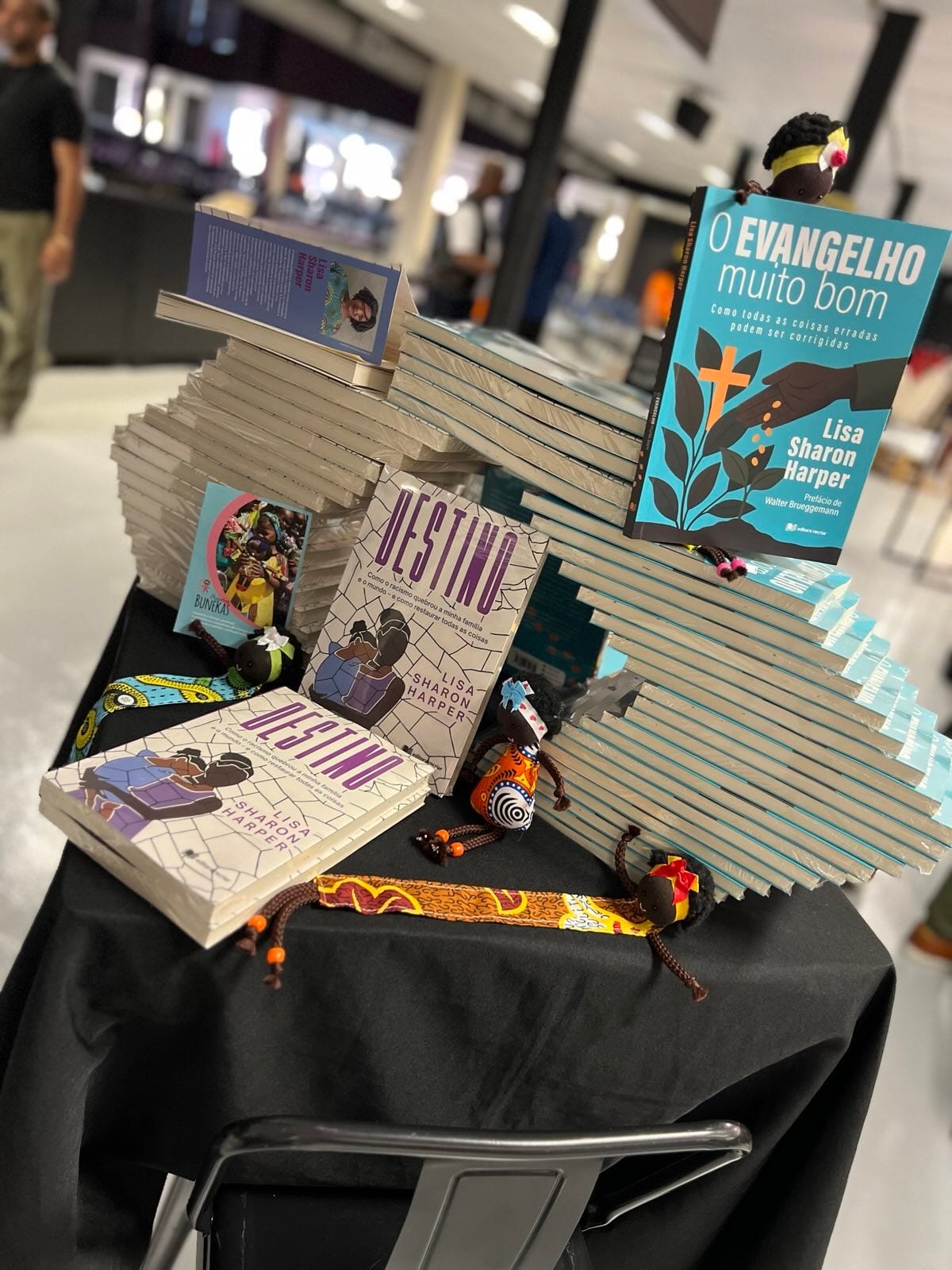Cross-posted from
On June 22, I preached the sermon for the 11am service of Igreja Batista de Agua Branca church (IBAB) in São Paulo, Brazil. IBAB is the largest single church in South America—planted by Southern Baptists. There is history here.
Did you know that many confederate soldiers fled south to São Paulo after losing the Civil War? Brazil was one of the last bastions of slavocracy on the planet. By immigrating there they could continue their slaveholding way of life. So, Southern Baptist missionaries began planting churches in São Paulo in 1881. As a result, the majority of protestant churches in Brazil today have Southern Baptist roots.
I spoke at IBAB before, in November 2018, just before Bolsonaro came to power. At that time, the senior pastor, Ed Rene Kivitz, had invited me to speak on a weeknight about my book, The Very Good Gospel. About 100 people showed up in IBAB’s massive auditorium, which seats 2000. With the help of dynamic Brazilian leader and translator, Roseni Welmerink, I delivered a message on God’s call to become shalom-builders.
The audience was moved and provoked. But, I was struck by the conundrum commonly held by pastors of churches as large as some cities: How do they faithfully shepherd their flock toward the peaceable Kingdom of God in a way that doesn’t cause the flock to scatter before they get there? More to the point, how do pastors call their people to protect and cultivate the image of God in all through just public policy when some parishioners are committed to white and western supremacy? These questions cause pastors to freeze and say nothing at exactly the times when the image of God is most threatened in the world.
But, Jesus is clear: “No servant can serve two masters…You cannot serve both God and wealth.” (Luke 16:13, NASB)
The number one reason white evangelical pastors tell me that they are afraid to speak up in critical moments is that they fear the power of money–losing it. They are afraid that rich tithers will punish them by leaving their churches. But, Jesus is clear: “No servant can serve two masters…You cannot serve both God and wealth.” (Luke 16:13, NASB)
But is fear of losing money really the reason? Or is there a deeper issue?
A while back, I met my pastor, who was also a friend, for coffee at a local hangout. I wanted to explain to him why I was choosing to leave his fast-growing evangelical church. The church was known for being “multi-ethnic” and justice-minded. But, when Trayvon Martin’s murderer, George Zimmerman, was declared not guilty on a Sunday. The following Sunday, Black congregations across the U.S. stood in solidarity with Trayvon and Black men by wearing hoodies to church. But I was the only one wearing a hoodie in my majority white “multi-ethnic” church that day. No one mentioned the political reality that Stand Your Ground laws had proliferated the U.S. and effectively legalized the murder of innocent Black people for the first time since before passage of the Civil Rights Act of 1964. No one mentioned the trauma the Black community was going through or even stopped to pray for our nation. I sat in a sea of white people worshipping to Hillsong-ish music. They loved the sermon, which focused on how to succeed at work–or something like that. I left that service feeling utterly alone.
“But why are they not ready,” I asked? “They are not ready, because you have not led them.”
Over coffee, my pastor and friend explained to me that he had to be careful about what he speaks out on because there are people in the congregation with different politics.
“They aren’t ready for that conversation,” he said.
“But why are they not ready,” I asked? “They are not ready, because you have not led them.”
I shared that this primary and guiding question betrays a stark reality: His circle of concern was drawn narrowly around the conservative white men and women in his congregation. It did not include me–or anyone like me. I and those like me were being sacrificed on the altar of “but these white people aren’t ready.”
I’m not so sure this is an issue of love of money. I think rather the core issue is that silent pastors are not devoted to those Jesus called “the least of these”--not enough. They lack proximity. As a result, they have no relationship, little empathy, and ultimately no solidarity. This is not true for pastors of churches full of the ones Howard Thurman said live with their backs up against the wall. For pastors of churches full of targeted peoples the call to justice is not theoretical. It is not debateable. It is core to their call to shepherd, because they must engage the lived realities of the targeted ones in their congregations.
To lack solidarity with the thirsty, the sick, the imprisoned, or the destitute is to lack solidarity with Jesus, who was God incarnate.
This is a great conundrum, indeed. Not only does the silence of these pastors reveal a lack of Christian compassion, but Jesus says: “I am the least of these.” To lack proximity to the immigrant, is to lack proximity to Jesus. To lack empathy for the hungry is to lack empathy for Jesus. To lack solidarity with the thirsty, the sick, the imprisoned, or the destitute is to lack solidarity with Jesus, who was God incarnate. To lack proximity to the least of these is to lack proximity to God.
In 2018, Bolsonaro had just been elected, but had not yet been sworn in. He entered office in January 2019. Immediately, Bolsonaro targeted Black, indigenous, and LGBTQ+ people and he aimed to exploit the Amazon rainforest–drastically reducing the primary source of oxygen for planet earth.
Reflecting on The Very Good Gospel’s call to be reconciled to all humanity and all creation, Pastor Ed Kivitz condemned Bolsonaro’s politics from the pulpit.
Predictably, IBAB lost many of its top tithers.
But, Pastor Ed did not relent. He kept preaching The Very Good Gospel’s call to build shalom on earth as it is in heaven! His words reached the ears of many targeted Brazilians who found their way to IBAB and made the community their own spiritual home. To date, IBAB has gained as many parishioners as it lost.
Flash forward to June 22, 2025. Bolsonaro is no longer in office, but Brazil is in a fragile state similar to that of the U.S. toward the end of the Biden era. Fueled by confederate faith, the nation is vulnerable to the backlash of a second authoritarian takeover.
The pastors of IBAB invited South African peacebuilder, Rev. Rene August to offer the sermon in the 9am service and asked me to share the message of the Very Good Gospel for the 11am service. Again, Roseni Welmerink joined me as a skilled translator and I preached before thousands on the “Four Words That Change Everything.” (You can watch the full video above.) It was holy ground.
I witnessed with my own eyes what is possible when the church determines to dethrone the power of whiteness and embrace the Very Good Gospel.
Over the next week, I met with IBAB’s leaders, its Black Consciousness Forum, and conducted an all-day training on “How to be an Anti-racist” for the Conversas Pastorais program of Instituto Galilea.
IBAB’s leaders and its community of partners are fired up!!
And so am I.
I witnessed with my own eyes what is possible when the church determines to dethrone the power of whiteness and embrace The Very Good Gospel.
This is especially salient for us in the U.S. right now.
Days after I returned from Brazil, Republicans took a machete to those Jesus called “the least of these” (and the middle class too).The enabling silence of white (and whiteness-allied) churches across the U.S., especially megachurches, will result in the desecration of the image of God among us through unnecessary hunger, sickness, impoverishment and death over the next four years. Actual faith in God chooses the ways of God, even unto the cross. Strategic silence coddled money and sold the Gospel down river.
Please pray for Pastor Ed, the rising Senior Pastor Kenner Terra, the leader of IBAB’s Black Consciousness Forum, Pastor José Malua, and the executive director of Instituto Galilea, Fernanda Kivitz. And pray for the church leadership team, and for our translator, Roseni, and the folks at Editora Recriar, the publishing house that translated The Very Good Gospel and Fortune into Portuguese. Their translation work is extending the reach of this restorative message.
And pray for us all that we would finally resolve to dethrone whiteness and walk with Jesus on the road to Freedom.
President and founder of FreedomRoad.us, Lisa Sharon Harper is a writer, podcaster and public theologian. Lisa is author of critically acclaimed book, Fortune: How Race Broke My Family And The World—And How To Repair It All.
Connect
Connect with Lisa: Website | Instagram | Facebook | Threads | Linked In
Connect with Freedom Road: Institute Courses | Patreon | Podcast | Instagram | Threads






